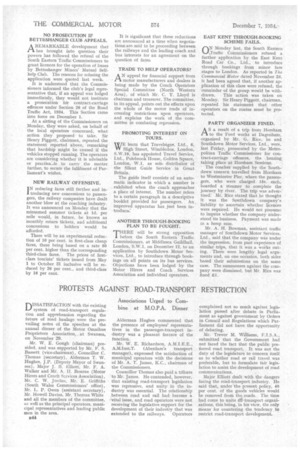PROTESTS AGAINST ROAD-TRANSPORT RESTRICTION
Page 58

If you've noticed an error in this article please click here to report it so we can fix it.
Associations Urged to Combine at M.O.P.A. Dinner DISSATISFACTION with the existing system of road-transport regulation and apprehension regarding the future of road haulage were the prevailing notes of the speeches at the annual dinner of the Motor Omnibus Proprietors Association, at Swansea, on November 29.
Mr. W. E. Gough (chairman) presided, and was supported by Mr. F. S. Bassett (vice-chairman), Councillor C. Thomas (secretary), Alderman T. W. Hughes, J.P. (Deputy Mayor of Swansea), Major J. 13. Elliott, Mr. F. A. Walker and Mr. A. IL Bourne (Motor Hirers and Coach Services Association), Mr. C. W. Jordan, Mr. E. Griffiths (South Wales Commissioners' office), Mr. L. P. Owen (assistant secretary), Mr. Howell Davies, Mr. Thomas White and all the members of the committee, as well as the principal operators, municipal representatives and leading public men in the area.
B44 Alderman Hughes commented that the presence of employees' representatives in the passenger-transport industry was a pleasant feature of the function.
Mr. W. E. Richardson, A.M.I.E.E., A.M.Inst.T. (Aberdare's transport manager), expressed the satisfaction of municipal operators with the decisions of Mr. A. T. James, K.C., chairman of the Commissioners.
Councillor Thomas also paid a tribute to Mr. James. He contended, however, that existing road-transport legislation was repressive, and unity in the industry was essential. The relationship between road and rail had become a .:vital issue, and road operators were not receiving the legislative support for the development of their industry that was extended to the railways. Operators complained not so much against legislation passed after debate in Parliament as against government by Orders in Council and Regulations which Parliament did not have the opportunity of debating.
Mr. Trevor M. Williams, F.I.S A., submitted that the Government had not faced the fact that the public preferred road transport. It was not the duty of the legislature to concern itself as to whether road or rail travel was preferable, but to formulate fair legislation to assist the development of road communications.
Major Elliott dealt with the dangers facing the road-transport industry. He said that, under the present policy, 40 per cent, of the goods vehicles would be removed from the roads. The time had come to unite all-transport organizations, this being, in his view, the only means for countering the tendency to restrict road-transport development.




























































































